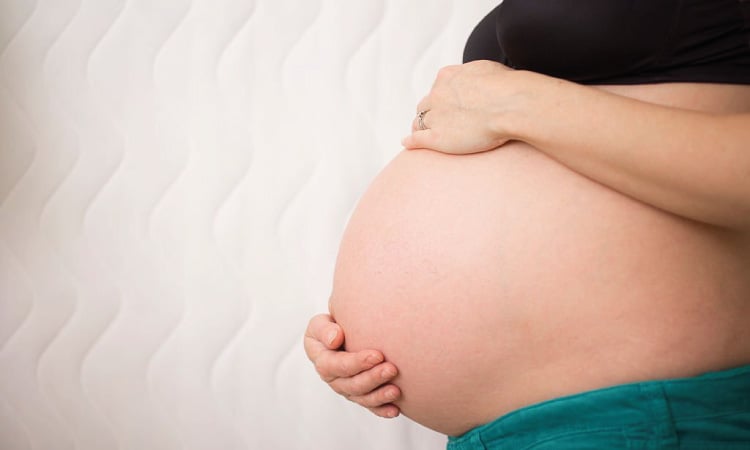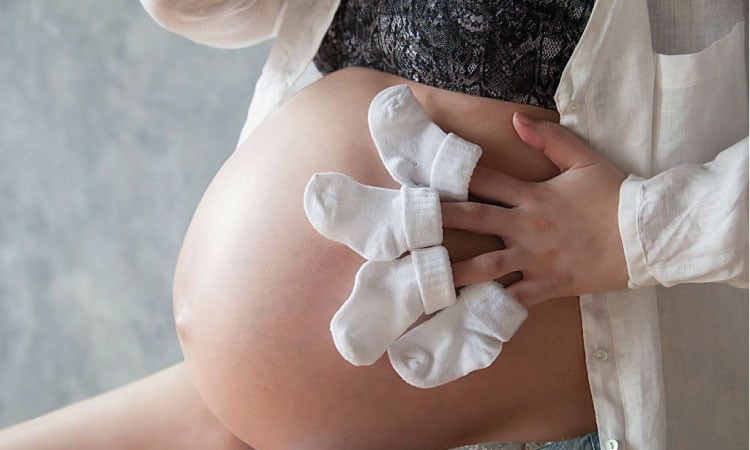A pregnancy with twins can present some unique challenges not seen in a single pregnancy. It is more common for women who have twin pregnancies to suffer from pregnancy-related health issues and complications. Twin pregnancies require special care, including extra prenatal appointments and nutrition advice. So, it’s important to be aware of the early signs of a twin pregnancy. “How do I tell if I’m pregnant with twins?” is a frequently asked question among women who suspect they are carrying more than one baby.
How Do Twins Form?
Two primary factors lead to twin pregnancies. One possibility is to divide an embryo that has already been fertilized into two separate embryos. Having identical twins would be a result of this procedure. The other possibility is two eggs are released and fertilized separately, resulting in two distinct babies; this is known as having fraternal twins. Identical twins share a great deal of the same DNA and genetic makeup, and they appear nearly identical. In contrast to identical twins, fraternal twins do not have an extremely similar appearance. However, they do share the same DNA. Twins are formed by a variety of different factors, but most often, they just happen by chance.
What Increases The Odds Of Twin Pregnancy?
Although a pregnancy with twins or multiples can “just happen” on occasion, there are certain factors that can significantly increase the likelihood of twins or multiples. The following are some of these contributing factors:

- Family history: If twins run in your family, especially on your mother’s side, your chances of having twins may be higher. Hyper-ovulation, which occurs when a woman’s body releases two or more eggs at the same time she ovulates, is one of the causes of having twins. The trait can be inherited
- Fertility treatment: Many medicines used in fertility treatment stimulate the ovary, resulting in the production of more than one egg at a time. This increases the chances of twin pregnancy
- Maternal age: Women over 35 years old have a greater chance of having twins. Women that age tends to release more than one egg per cycle. This is due to the beginning of menopausal hormonal changes
- Obesity: Obesity increases the odds of conceiving twins. The BMI of women with 30 or more was associated with an increased likelihood of conceiving twins1
Related Reading: 21 Pregnancy Superfoods To Include In Your Pregnancy Diet
How Early Can You Feel Twin Pregnancy?
Having an ultrasound during your first trimester is the only way to know for sure if you are expecting twins. In most cases, this is done between weeks 6 and 9. However, the procedure can be performed at any time between weeks 14 and 18.
Your doctor will likely perform an ultrasound during your fourth week of pregnancy to confirm the presence of twins. However, getting an ultrasound before the sixth week of pregnancy isn’t very common, with the possible exception of situations involving complications. Another exception is women who are going through fertility treatments. In both instances, the doctor will perform an early twin ultrasound at 4 or 5 weeks of pregnancy to determine if the patient is carrying twins.
Calculate Due Date With Conception Date
In addition, if a doctor has doubts about a twin pregnancy based on other signs and symptoms, such as elevated human chorionic gonadotropin (hCG) levels, he will opt for an ultrasound to detect a twin pregnancy as early as five weeks. In fact, a high hCG level can be counted as one of the signs of having twins at 5 weeks.
9 Early Signs Of A Twin Pregnancy

If you experience pregnancy symptoms very early, there is a possibility that you are carrying twins. The feelings of extreme fatigue, emotional ups and downs, nausea, vomiting, and constipation are some of the noticeable pregnancy symptoms. If you have undergone fertility treatment, particularly if more than one embryo was transferred, or if you used specific fertility drugs in order to assist you in becoming pregnant, you may also have reason to suspect that you are carrying twins.
Discover below the 9 earliest signs you might be pregnant with twins:
- Intense morning sickness: Certain pregnancy symptoms are worse when you have more babies inside you. It is common for mothers expecting twins to experience a more severe form of morning sickness than mothers expecting only one child. In twin pregnancies, nausea and vomiting can be more severe because of higher levels of the hCG hormone in the bloodstream. You may have noticed that morning sickness begins earlier and lasts longer than normal. Pregnant women carrying twins are more likely than other expectant women to suffer from hyperemesis gravidarum, a condition characterized by extreme nausea and vomiting2. In twin pregnancies, morning sickness can be particularly severe because of the greater increase in several pregnancy hormones. We recommend these snacks to combat morning sickness during pregnancy
- Severe breast pain: Breast pain is one of the common early pregnancy pains. Breast pain can become more intense during early pregnancy when expecting twins or multiples. Since the breasts are preparing to feed more than one baby, the hormones that are responsible for causing these preparations may be high. This contributes to relatively intense breast pain, which is counted as one of the very early signs of a twin pregnancy
- Early detection of heartbeats: Approximately 5 to 8 weeks into the pregnancy, each baby’s heart is beginning to form and may start beating3. As early as 10 to 12 weeks into your pregnancy, your physician should be able to detect two separate heartbeats. If this is the case, a confirmation can be obtained through an ultrasound scan
- The urge to urinate often: Women who are pregnant may first notice that they have to go to the bathroom more often. A rise in levels of the hormones progesterone and human chorionic gonadotropin are responsible for this condition. Because hCG levels rise more quickly in twin pregnancies than they do in singleton pregnancies, the increased frequency with which you have to use the restroom may be especially noticeable
- More swellings: Women are naturally more likely to retain water when pregnant, and having two babies in the womb means more swelling. Swelling in ankles and joints is more common in twin moms because of the increased volume of water retained in the body. In a typical pregnancy, it manifests itself during the second trimester, but in a pregnancy with twins, the mother can experience it much earlier. If you feel that the discomfort is becoming intolerable, you should talk to your doctor about it. Swelling can be an indication of underlying complications as well
- “Showing” sooner than usual: Physical changes in twin pregnancy are more noticeable than in a single pregnancy. The uterus of a mother carrying twins will expand at a quicker rate when compared to that of a mother who is carrying only one child because it will need to make more room inside the body at a quicker rate to accommodate the two infants. An increased appetite and rapid weight gain are two additional early indicators that a woman is carrying twins. When carrying twins, a woman typically begins “showing” earlier in her pregnancy than when carrying only one child. Having twins may cause a mother to gain more weight than she would with just one child
- Increased heart rate of the mother: A woman’s basal metabolic rate rises during pregnancy in order to produce more energy and nutrients for the developing baby. When carrying twins, a woman’s basal metabolic rate will be even higher than usual. During pregnancy, a woman’s heart rate can increase to anywhere between 80 and 100 beats per minute. However, when comparing twin pregnancies to singleton pregnancies, the maternal cardiac output was found to be 20% higher in twin pregnancies4
- Extreme fatigue: Pregnant women are bound to experience fatigue, but many mothers-to-be who are carrying twins say they are completely worn out. The rapid increase in progesterone that occurs during pregnancy to support the development of two babies, in conjunction with an increased basal metabolic rate (the rate at which the body uses energy), can be the root cause of the incapacitating fatigue. In addition, the first trimester of pregnancy is the most important one for the development of the baby’s vital organs. So, when your body is putting all of its energy into caring for two babies, it can take a physical toll on your body
- Intense mood swings: Mood swings are something that may be experienced by someone who is going through major hormonal shifts. Mood swings are common during pregnancy. As with other early signs of twin pregnancy, mood swings caused by massive hormonal changes may indicate twin pregnancy
Related Reading: 15 Tried And Tested Ways To Handle Emotions During Pregnancy
Can Twins Be Detected In Early Pregnancy?
First trimester ultrasounds are typically used to determine if you’re pregnant with twins. An ultrasound is the most reliable method for identifying a twin pregnancy in its early stages. However, a pregnancy blood test may be able to identify a twin pregnancy even earlier in some cases. Blood tests can generally make the diagnosis of twin pregnancies as early as six to seven weeks into a pregnancy.
How Do You Confirm You Are Pregnant With Twins?
There are many signs that a woman is carrying more than one baby, but there are only a few surefire ways to determine whether or not she is carrying twins.
Twin pregnancies are detected by:
- AFP Test: The fetal liver secretes a protein known as AFP, which is measured by an imaging test known as the AFP test. You may have had multiple pregnancies if your AFP levels are elevated
- Ultrasound: Confirmation that you are pregnant with twins can be determined unequivocally via ultrasound imaging.Because an ultrasound detects sound waves and generates a live image of the uterus, the technician will be able to see clearly if there are multiple fetuses inside. This is only possible after the 10- to 12-week mark when the fetus begins to grow and become identifiable
Conclusion

It is entertaining to speculate whether you are carrying one or two babies. When it comes to a twin pregnancy, no matter how many symptoms you’re experiencing, an ultrasound is the only way to know for sure how many babies you are carrying. Pregnancy with twins or more is exciting, but it also carries certain risks. During pregnancy with multiple babies, it is even more crucial for the mother to pay attention to her health and seek prenatal care from the early stages of pregnancy.
FAQs
Once the embryo has successfully implanted in the uterus, your body will start producing hCG. During the first few weeks of pregnancy, there is a sharp rise in levels, and for the next 10 weeks, they will typically double every two to three days.
If your doctor orders a blood test to measure your hCG levels and they are sky-high, it could indicate that you are carrying two (or more) babies.
In addition, a high alpha-fetoprotein level in the blood can also indicate twin pregnancy. Your baby’s liver releases this protein into your blood. High levels of this protein indicate more than one baby is making the protein.
An early ultrasound might not detect one of two identical twins if one of them is hiding behind the other while being scanned.
However, this rarely happens. The ultrasound at 20 weeks will tell you for sure if you are pregnant with twins or not!
